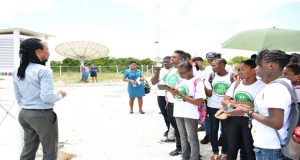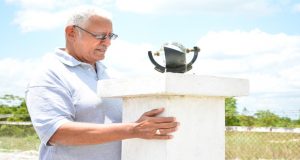REBUILDING the public’s trust in Guyana’s Hydrometeorological Service remains high on the agenda, Chief Hydrometeorological Officer (ag), Dr Garvin Cummings said as he delivered remarks at the National Weather Watch Centre Hyde Park, Timehri where an open day was being held yesterday to commemorate the Hydrometeorological Service’s 50th Anniversary. Speaking in the presence of Agriculture Minister Noel Holder and Permanent Secretary George Jervis, Dr. Cummings said hydromet in Guyana would have had many successes but an equal amount of challenges.

“One of the greatest challenges that we are still faced with is the ability to convince those in the public domain that the information that we gave is actually reliable.”
He added that “it is a challenge that every met service, every hydrometeorological service globally faces. How do you change the public’s perception of our hydrometeorology? How do you show the importance of hydrometeorology to a country’s national development?”
Though hydrometeorology plays a significant role in the main sectors of any country’s economy, be it in the areas of agriculture, engineering or climate change, Dr. Cummings said persons do not understand or see the importance of the service.
He subsequently told the Guyana Chronicle that due to the dynamic nature of the atmosphere, it is important to deliver the relevant information in a timely and effective manner but this again remains a problem for the Hydromet Office.
“We do not control the atmosphere, we try to forecast what the atmosphere may become or may be that might change with time. That is why I think the ability to communicate in a timely manner is so important because today we can have a hurricane going to Barbados but tomorrow it is going to St. Lucia,” he explained.
INFORMING THE PUBLIC
As such the Chief Hydrometeorological Officer (ag) said while the Doppler Weather Radar System is important, the inability to effectively disseminate the relevant information to the public can be a major stumbling block.
“While we have these different observational tools, one of the most important aspects of forecasting is to be able to communicate that information to the public in a timely manner, in a way that they can understand. We are dealing with technicians and scientists who are not communication specialists.”
TRAINED IN THE SCIENCES
Additionally, he told this newspaper that while there is no deficiency within the system in terms of technology, there is certainly a human resources deficit. “We have a need for persons who are trained in the sciences, mathematics, physics, chemistry; that is the nature of the work. So, if you don’t have a background in the sciences, it would be very difficult for you to come into the ‘hydromet’ service.”
In recent years, the Hydromet Office has come in for major criticisms due to the apparent inability to provide accurate and timely weather forecast to the public.
Meanwhile, in delivering the feature address, the Agriculture Minister urged the Hydrometeorological Service to work assiduously to fulfill its mandate. “On this day,” he said, “let us examine the successes of the past, while we work presently to fulfill our mission, and strive to meet the expectations of those who put their trust in what we can deliver.”

In highlighting the work of the ‘hydromet’ office, Minister Holder pointed out that it provides the weather information through the operation of 14 automatic weather stations, seven meteorological observatories or synoptic stations, 60 water-level stations, and 148 rainfall stations.
He said: “It is important to understand the science of the atmosphere, dynamics of water – surface and groundwater – sea level, climate and its impacts on proposed development including road building, as hydrometeorological data is important in engineering designs when constructing sea defences, conservancies, bridges and roads.”
The hydrometeorological service is also the focal point for climate and environmental protocols such as the United Nations Framework Convention on Climate Change and the Vienna Convention on the Protection of the Ozone Layer.
Its contribution to the aviation sector is also of great importance, the Agriculture Minister noted, adding that aircraft would not be able to enter and or exit the country without meteorological information at international airports. “The field of hydrometeorology provides for safety, wellbeing, growth and prosperity in several areas, thus it offers opportunities to those who are inclined to work beyond the call of duty in some instances, as data collection in remote areas can be; there are data collection stations in all regions.”
In observance of the Hydrometeorological Service’s 50TH Anniversary, the Agriculture Minister participated in the inaugural hoisting of the service’s flag which was also launched yesterday. Additionally, the minister and his team and students from the Guyana School of Agriculture (GSA) were given an opportunity to tour the National Weather Watch Centre. This year’s anniversary is being observed under the theme “Committed to advancing Hydrometeorology for sustainable future.”
On October 5, 1965 the Central Hydrometeorological Service within the government structure of British Guiana was established within the Ministry of Works and Hydraulics. However by 1991, the hydromet service was transferred to the Agriculture Ministry. During the early years of the office it was made up of three sections: meteorology, aviation and hydrology. However, due to growing demands of the agriculture sector, its services were expanded tremendously.




.png)









